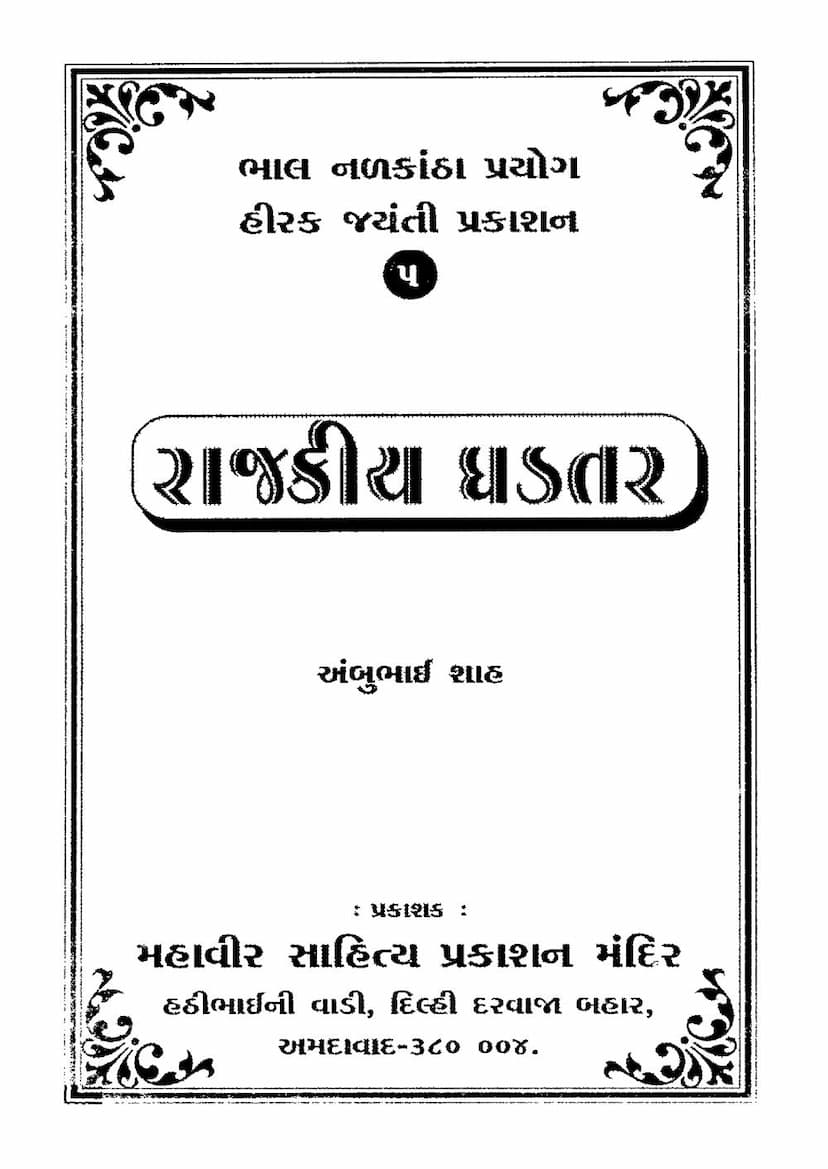Rajkiya Ghadtar
Added to library: September 2, 2025

Summary
This document is a compilation of essays and statements by Ambubhai Shah, published by Mahavir Sahitya Prakashan Mandir, Ahmedabad, in 1998. The book, titled "Rajkiya Ghadtar" (Political Re-structuring), is a collection of articles written between 1989 and 1992, along with appendices, reflecting on the state of Indian democracy and proposing a path forward guided by Jain principles and Gandhian ideals.
The central theme of the book is the purification and re-orientation of politics in India. Ambubhai Shah, inspired by Muni Shri Santbalji and Mahatma Gandhi, advocates for a shift from power-centric, corrupt politics to a value-based, people-centric approach.
Here's a summary of the key themes and arguments presented across the articles:
Critique of the Current Political System:
- Corruption and Self-Interest: The book extensively criticizes the prevalent corruption, the pursuit of power, wealth, and prestige as the primary motivators for political actors, and the erosion of moral and ethical values in politics.
- Erosion of People's Power: The author argues that the state has usurped the power that rightfully belongs to the people. People are reduced to mere voters who exercise their right every five years, often influenced by temptation and fear.
- Ineffectiveness of Political Parties: Shah believes that existing political parties, whether in power or opposition, are primarily focused on gaining and retaining power, leading to compromises and a lack of focus on true public welfare. He questions their ability to bring about fundamental change.
- "Pradnya Vilopan" (Loss of Wisdom): A recurring point is the absence of genuine wisdom and ethical reasoning in politics, leading to ineffective decision-making and the inability to solve societal problems.
- The "State" as the Central Power: The author emphasizes that the "State" (as an institution of power, not necessarily the government of the day) has become all-pervasive, controlling every aspect of life, which is detrimental to individual freedom and societal well-being.
Proposed Solutions and Vision:
- Value-Based Politics ("Mulyanishtha Rajkaran"): The core proposal is to introduce value-based politics, where principles of honesty, integrity, impartiality, and public welfare guide political actions.
- "Political Factor" vs. "Political Party": Shah advocates for sending "political factors" rather than strict "political parties" into legislative bodies. These would be individuals chosen by the people, committed to values, independent of party diktats, and focused on the common good.
- Empowering the People: The book stresses the need to decentralize power and strengthen grassroots democratic institutions like Gram Panchayats and local self-governance bodies. The goal is to shift the center of power from the state back to the people.
- "Lok Chetna Jagran" (Awakening of People's Consciousness): A significant emphasis is placed on educating and mobilizing the public to understand their rights, responsibilities, and the need for a participatory democracy.
- "Lok Umedwar" (People's Candidates): The idea of fielding candidates who are not driven by personal gain but by a commitment to public service and values is central. These candidates should be accountable to the people and act as a check on power.
- Active Neutrality and Constructive Engagement: Drawing inspiration from Nehru's foreign policy of non-alignment, Shah suggests an approach of "active neutrality" in domestic politics. This means supporting correct policies regardless of the party and opposing incorrect ones, without being tied to any specific party's agenda.
- Parliamentary Reform: The book suggests sending a certain percentage of representatives (around 10%) who are committed to values and operate outside the influence of power, acting as "guardians of the national conscience."
- Voter's Role: Shah proposes innovative ways for voters to express their dissatisfaction with all candidates, such as casting a "negative vote" by marking all candidates or introducing a "zero" symbol for abstention, which would be counted and publicized.
- Dialogue and Consensus: The importance of dialogue, mutual understanding, and consensus-building among like-minded individuals and organizations is highlighted for bringing about political change.
Inspiration and Methodology:
- Gandhian Ideals: The work is deeply rooted in Gandhian philosophy, emphasizing truth, non-violence, self-reliance, and the purification of politics.
- Jain Principles: The author's Jain background influences his emphasis on ethical conduct, detachment from worldly possessions and power ("Parigrah," "Pran," "Pratishtha"), and the pursuit of righteousness.
- Muni Shri Santbalji: The book is a continuation of the work and teachings of Muni Shri Santbalji, who dedicated his life to social reform and political purification.
- "Bhal Nalkantha Prayog": This refers to a practical experiment and movement initiated in the Bhal Nalkantha region of Gujarat, aiming to implement these political reforms at the grassroots level.
Appendices:
The appendices include a letter to V.P. Singh, a public statement by the Bhal Nalkantha Kisan Mandal, and a discussion on the Lok Sabha elections, further elaborating on the practical application of these ideas and the challenges faced.
In essence, "Rajkiya Ghadtar" is a call to action for citizens and political activists to actively participate in reforming the political landscape by prioritizing values, people's power, and ethical governance, moving away from the current system dominated by power-hungry and corrupt practices.